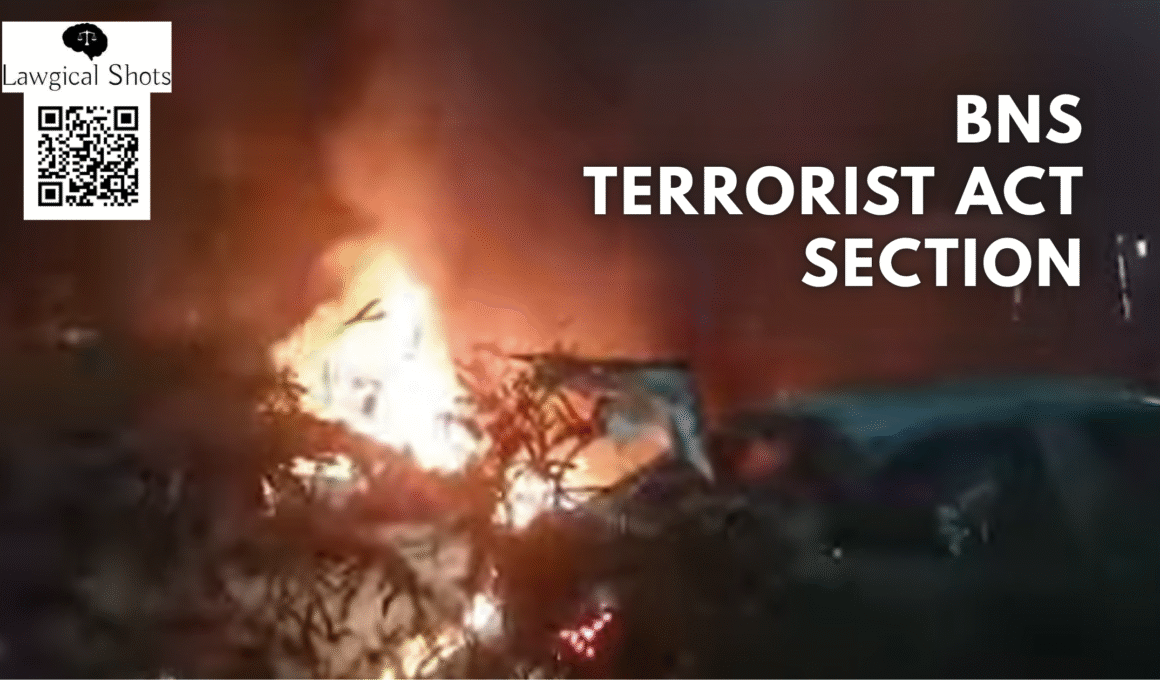Faridabad RDX news sent some shocks across the country. Some of us were still coping with the numbers and differences when news reflected 2900 kilos and almost 400 kilos of explosives. However, the Delhi Red Fort blast did not give a chance to recover. While the whole nation is on alert, it is important to catch those who made this happen – actively or behind the curtains. BNS Terrorist Act Section 113 defines and lays the punishment for those who spread terrorism and threaten the people targeting India’s security. Here is a simplification of BNS terrorism definition and the accompanying clauses that widen the scope for punishing the terrorists.
Delhi Blast and Faridabad RDX News
In Faridabad, Haryana, law-enforcement agencies uncovered a very large cache of explosive materials. This happened after a coordinated operation triggered by the arrest of a doctor linked to the terror outfit Jaish‑e‑Mohammed. The morning news revealed roughly 300-360 kg of suspected RDX and other materials including weapons and ammunition from a rented accommodation in Faridabad’s Dhauj village. Subsequent searches led to discovery of a much larger quantity, nearly 2,900 kg of explosive and inflammable material. While the investigators were looking into details, a car explosion near Delhi’s Red Fort metro station took place around 6:52 pm on 10 November 2025. The blast happened in a slow-moving vehicle stopping at a signal, killing at least eight people and injuring dozens. Nearby vehicles also caught fire.
Together, these events raise alarm about a potential terror network operating across the Delhi-NCR area, manufacturing or sourcing large quantities of explosive materials in Faridabad. They might also possibly be executing or planning further attacks in Delhi. Security forces are treating the incidents as connected rather than isolated. Let us explore how BNS punishes those involved.
BNS Terrorist Act Section 113
The Indian Penal Code has been a widely famous criminal law which even legally illiterate were familiar with. However, it is a shocking fact that the law kept mum on terrorism. Maybe that is why the New Criminal Laws through Bharatiya Nyaya Sanhita seek to widen the scope of punishment for terrorism. BNS Terrorist Act Section defines what constitutes terrorism. It punishes active participation in terror attacks, its preparation, incitement, concealment or harbour as well. It is important to understand the newly introduced law on terrorism, as simplified below:
“113. Terrorist Act – (1) Whoever does any act with the intent to threaten or likely to threaten the unity, integrity, sovereignty, security, or economic security of India or with the intent to strike terror or likely to strike terror in the people or any section of the people in India or in any foreign country,––”
Comment: The provision under Section 113 of BNS in whole defines what constitutes a terrorist act. Sub-Section 1 of Section 113 states that any act done with the intention to threaten the unity, integrity, sovereignty, security, or economic security of India or to strike terror among people constitutes a terrorist act. The upcoming part of the provision defines which acts are included here:
“(a) by using bombs, dynamite or other explosive substance or inflammable substance or firearms or other lethal weapons or poisonous or noxious gases or other chemicals or by any other substance (whether biological, radioactive, nuclear or otherwise) of a hazardous nature or by any other means of whatever nature to cause or likely to cause,— “
Comment: The main part or sub-section (1) of BNS Terrorist Act Section 113 points towards the acts aimed at threatening in the name of India’s security or striking terror. The clause (a) under the same delineates the act in this regard. The said act could be committed using bombs or other explosives, firearms, lethal weapons or gases, etc. What happened in the recent Delhi Red Fort blast, and what was planned as per Faridabad RDX news, brings clarity for this part of bNS terrorism definition.
It may also be committed by using other biological, radioactive, nuclear substances, hazardous in nature. The act committed to threaten people or strike terror could aimed at particular results as discussed in sub-clauses:
“(i) death of, or injury to, any person or persons; or”
Comment: BNS Terrorist Act Section 113 defines terrorist act committed by threatening or striking terror to cause death or injury to one or more persons. The sub-clause here makes it clear that mass killings are not necessary for defining a terror attack under Bharatiya Nyaya Sanhita.
“(ii) loss of, or damage to, or destruction of, property; or”
Comment: The desired outcome of a terrorist act not necessarily needs to be loss of lives. It can be damage caused to property as well. So if a terrorist bombs a car parking or an empty building, that will also be punishable under BNS Terrorist Act Section. The intention behind such loss caused may be to strike terror or threaten people of India for its security.
“(iii) disruption of any supplies or services essential to the life of the community in India or in any foreign country; or”
Comment: There are some basics which are essential for survival of any person. If a terrorist act tends to disrupt any such services or supplies essential for life of people in an Indian or foreign community, it is punishable as per BNSS terrorism definition.
“(iv) damage to, the monetary stability of India by way of production or smuggling or circulation of counterfeit Indian paper currency, coin or of any other material; or”
Comment: Any country’s strength lies with its monetary stability. If someone disrupts it by producing, smuggling or circulating counterfeit Indian currency, it constitutes a terrorist act under BNS. The main part still remains the intent of compromising India’s security or spreading terror. The currency here could be paper currency, coins, or any other material.
“(v) damage or destruction of any property in India or in a foreign country used or intended to be used for the defence of India or in connection with any other purposes of the Government of India, any State Government or any of their agencies; or”
Comment: Damage caused to a property which is made to be used for Indian defense or Government purposes constitutes a terrorist act under BNS 2023. The sub-clause (v) to Section 113 (1)(a) makes it clear that such property need not necessarily be located in India. It may be located in a foreign country, but tend to be used for Indian defense or Government or other agencies.
“(b) overawes by means of criminal force or the show of criminal force or attempts to do so or causes death of any public functionary or attempts to cause death of any public functionary; or”
Comment: This part targets anyone who overawes a public functionary or attempts to do so by using criminal force, attempting to kill a public functionery. The BNS terrorist act definition punishes such persons for their intention to disrupt peace and strike terror in India.
“(c) detains, kidnaps or abducts any person and threatening to kill or injure such person or does any other act in order to compel the Government of India, any State Government or the Government of a foreign country or an international or inter-governmental organisation or any other person to do or abstain from doing any act, commit a terrorist act.”
Comment: BNS terrorism section seeks to punish anyone who detains, kidnaps or abducts a person, threatening to kill or injure. All this is done to compel the Union or State Government, or even a foreign Government or International organization to do something, or abstain from doing something. There are plenty of examples of terrorist acts where flights are hijacked and governments are forced to release certain prisoners against the freedom of people so detained. Those are now punishable under Section 113 of the Bharatiya Nyaya Sanhita.
“Explanation.—For the purpose of this sub-section,—”
Comment: There are certain terms used hereabove while BNS defines terrorism. To extend clarity, those terms have been defined under the explanation to BNS terrorist act Section.
“(a) “public functionary” means the constitutional authorities or any other functionary notified in the Official Gazette by the Central Government as public functionary; “
Comment: Threatening or causing death of a public functionary is categorized under terrorist act definition. The designation has been clarified here. It includes any Constitutional authority or anyone notified as public functionery by the Union Govt.
“(b) “counterfeit Indian currency” means the counterfeit currency as may be declared after examination by an authorised or notified forensic authority that such currency imitates or compromises with the key security features of Indian currency.”
Comment: Compromising India’s economic stability with counterfeit currency is another facet as BNS defines terrorism. It may be declared as counterfeit currency after being examined by the authorised or notified forensic authority. Declaration of counterfeit may be because it imitates certain features of Indian currency, or compromises some of them
“(2) Whoever commits a terrorist act shall,—”
Comment: Part 1 of BNS terrorism section 113 (1) defines what constitutes a terrorist act. Sub-Section (2) lays the punishment for terrorism in India.
“(a) if such offence has resulted in the death of any person, be punished with death or imprisonment for life, and shall also be liable to fine;”
Comment: BNS terrorist act definition lays extreme punishment when the terror attack leads to death of any person. He/she may be punishable with capital punishment or life imprisonment with fine.
“(b) in any other case, be punished with imprisonment for a term which shall not be less than five years but which may extend to imprisonment for life, and shall also be liable to fine.”
Comment: A terrorist attack which did not kill anyone may be punishable with imprisonment of minimum 5 years with fine. The BNS terrorist punishment may extend to life imprisonment as well based on the seriousness of the attack.
“(3) Whoever conspires or attempts to commit, or advocates, abets, advises or incites, directly or knowingly facilitates the commission of a terrorist act or any act preparatory to the commission of a terrorist act, shall be punished with imprisonment for a term which shall not be less than five years but which may extend to imprisonment for life, and shall also be liable to fine.”
Comment: Part 1 and 2 of BNS terrorist act Section 113 define and lay the punishment. Part 3 through Sub-Section (3) seeks to tuck those responsible in conspiracy, attempt, abetment, etc. Those who advocate or incite such terrorist acts are not left behind from being punished. Direct or knowledgeable facilitating terrorism or its preparation is punishable with minimum 5 years which may be extended to life imprisonment, with fine.
“(4) Whoever organises or causes to be organised any camp or camps for imparting training in terrorist act, or recruits or causes to be recruited any person or persons for commission of a terrorist act, shall be punished with imprisonment for a term which shall not be less than five years but which may extend to imprisonment for life, and shall also be liable to fine.”
Comment: Sub-Section (4) talks about terror camps organized for conducting training or recruitments for committing terrorist attacks. Those who make it happen are punishable with minimum imprisonment of 5 years with fine. The punishment may extend to life imprisonment based on the seriousness of the act.
“(5) Any person who is a member of an organisation which is involved in terrorist act, shall be punished with imprisonment for a term which may extend to imprisonment for life, and shall also be liable to fine. “
Comment: Active participation in terrorist acts is not necessary for punishment under BNS. Anyone who is even a member of an organization involved in terrorist act is punishable with maximum punishment of life imprisonment with fine.
“(6) Whoever voluntarily harbours or conceals, or attempts to harbour or conceal any person knowing that such person has committed a terrorist act shall be punished with imprisonment for a term which shall not be less than three years but which may extend to imprisonment for life, and shall also be liable to fine:
Provided that this sub-section shall not apply to any case in which the harbour or concealment is by the spouse of the offender.”
Comment: Anyone who is not part of a terrorist organization or act may be punished if they harbour or conceal someone who commits a terrorist act. They are punishable with minimum imprisonment of 3 years with fine. It may extend to life imprisonment as well. There is an exception in case of harbour or concealment by a spouse.
“(7) Whoever knowingly possesses any property derived or obtained from commission of any terrorist act or acquired through the commission of any terrorist act shall be punished with imprisonment for a term which may extend to imprisonment for life, and shall also be liable to fine.”
Comment: Possession of property derived or obtained by committing an act which falls under BNS terrorist act definition is punishable. In fact, acquiring a property via terrorism is punishable with a maximum of life imprisonment with fine.
“Explanation.—For the removal of doubts, it is hereby declared that the officer not below the rank of Superintendent of Police shall decide whether to register the case under this section or under the Unlawful Activities (Prevention) Act, 1967.”
Comment: BNS terrorism Section was not there under the Indian Penal Code. In other words, punishment for terrorism has been introduced through BNS, since it is otherwise tried under the Unlawful Activities (Prevention) Act, 1967. Therefore, to decide whether a case has to be registered under BNS terrorist act Section or under the provisions of UAPA is a task entrusted upon the Officer not below the rank of Superintendent of Police.
Experts say that BNS gives a wider scope for punishing terror activities as compared to the UAPA. However, in case of conflict among the applicability of UAPA or BNS, UAPA shall prevail for being a special law.








